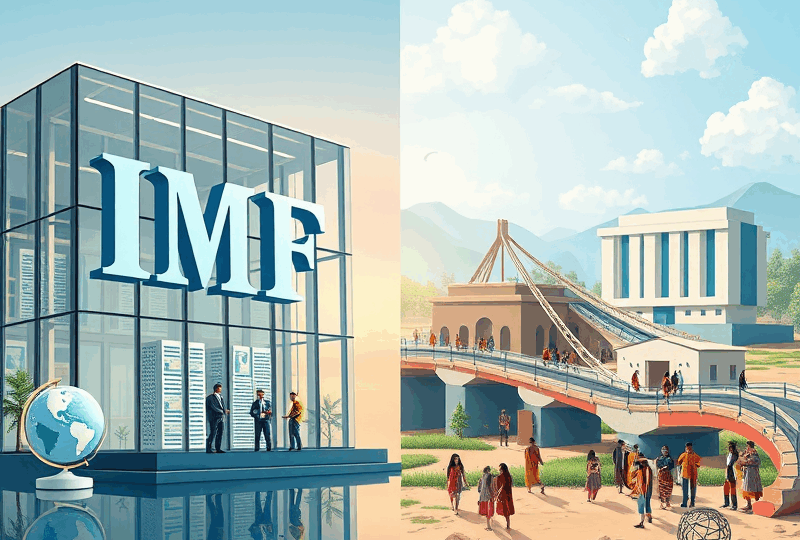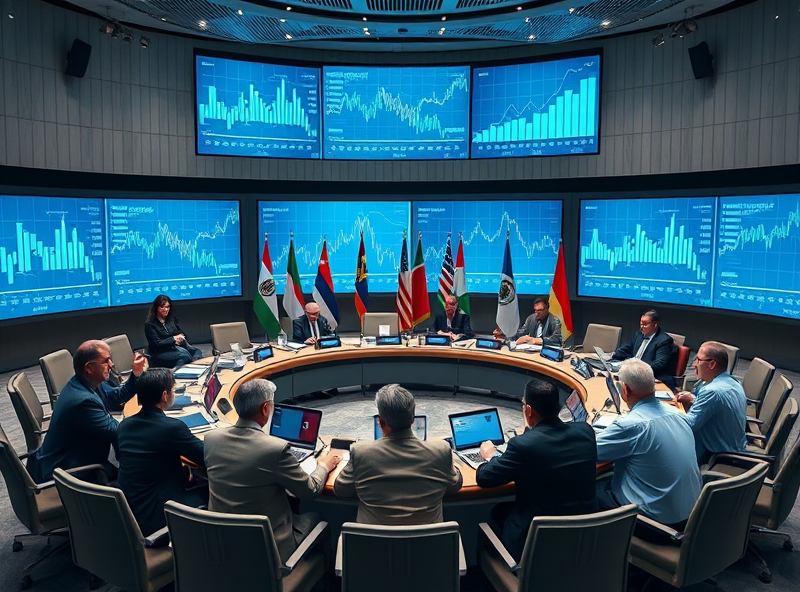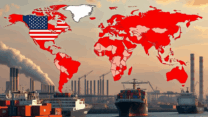
IMF vs World Bank: Understanding Their Global Roles

Hello, curious minds! When you hear about major international financial organizations, two names often come up: the International Monetary Fund (IMF) and the World Bank. They are both powerful institutions with global reach, and they both deal with money and countries around the world. Because of this, it’s easy to sometimes get them confused or wonder, “Aren’t they basically the same thing?” or “What exactly do they each do, and why does it matter?” You’re asking great questions! While they were created around the same time and often work together, the IMF and the World Bank have distinct missions, different ways of operating, and focus on different aspects of global economic well-being. The purpose of this article is to clearly explain the differences between the IMF and the World Bank, delve into their unique roles on the world stage, and help you understand why their work is so important for international financial stability and economic development. Let’s uncover what sets these two influential institutions apart and how they contribute to the global landscape.
Born from a Shared Vision: The Bretton Woods Era
To understand the IMF and the World Bank, it helps to look back at their origins. Both institutions were conceived at the Bretton Woods Conference in 1944, towards the end of World War II. The world leaders gathered there had a clear goal: to prevent the economic turmoil and protectionist policies that had contributed to the war and the Great Depression. They envisioned a new international economic order based on cooperation, stability, and reconstruction. The IMF was primarily created to oversee a system of fixed exchange rates and help countries manage their balance of payments, promoting global monetary cooperation. The World Bank, initially called the International Bank for Reconstruction and Development (IBRD), was established with the main task of financing the reconstruction of war-torn Europe. While their initial focuses were slightly different, they shared the overarching goal of building a more stable and prosperous global economy after the devastation of the war.
The IMF: Guardian of Global Financial Stability
The International Monetary Fund (IMF) focuses squarely on the macroeconomic and financial stability of the global system. Think of the IMF as the world’s financial firefighter and economic health monitor. Its primary mission is to ensure the stability of the international monetary system – the system of exchange rates and international payments that enables countries and their citizens to transact with each other. The IMF does this through three main functions:
- Surveillance: The IMF monitors the economic and financial policies of its member countries (almost every country in the world is a member) and provides policy advice. It keeps an eye on global economic trends, identifies potential risks, and offers recommendations to help countries maintain stable economies and avoid crises. This is like a regular check-up on the economic health of its members and the global system as a whole.
- Financial Assistance: When a member country faces a balance of payments problem – meaning it’s having trouble paying for its imports or servicing its foreign debt – the IMF can provide temporary financial assistance (loans). These loans are designed to help the country stabilize its economy, rebuild its international reserves, and implement policy reforms to address the root causes of the crisis. This is the “firefighting” role, providing emergency funds to prevent economic crises from spreading.
- Technical Assistance: The IMF provides practical help and training to member countries to improve their economic institutions and policies. This can include advice on managing public finances, strengthening banking systems, improving economic data collection, and designing effective monetary and fiscal policies. This helps countries build stronger, more resilient economies in the long run.
A country typically turns to the IMF when it’s facing a short-to-medium term financial crisis, such as a currency collapse, a sovereign debt crisis, or a severe balance of payments deficit. The financial assistance provided by the IMF often comes with “conditionality,” meaning the country must agree to implement specific economic policy reforms to receive and continue receiving the funds. These reforms are aimed at addressing the problems that led to the crisis, such as reducing government spending, raising interest rates, or reforming financial regulations.
The World Bank: Champion of Development and Poverty Reduction
In contrast to the IMF’s focus on stability, the World Bank Group is primarily dedicated to long-term economic development and poverty reduction. While it started with post-war reconstruction, its mission evolved to focus on helping developing countries grow their economies and improve the lives of their people. The World Bank Group is actually made up of five distinct but related institutions, with the two main lending arms being the International Bank for Reconstruction and Development (IBRD) and the International Development Association (IDA). IBRD provides loans to middle-income and creditworthy poorer countries, while IDA provides interest-free credits and grants to the world’s poorest countries. The other institutions focus on private sector development (International Finance Corporation – IFC), political risk insurance (Multilateral Investment Guarantee Agency – MIGA), and resolving investment disputes (International Centre for Settlement of Investment Disputes – ICSID).
The World Bank’s work involves:
- Providing Financing: The World Bank provides loans, credits, and grants to support a wide range of development projects in member countries. These projects are typically long-term investments in areas like infrastructure (roads, power plants, dams), education, health, agriculture, environmental protection, and governance.
- Offering Knowledge and Advice: The World Bank is also a major source of research, data, and expertise on development issues. It provides policy advice and technical assistance to help countries design and implement effective development strategies and projects.
- Working to End Poverty: The overarching goals of the World Bank are to end extreme poverty and promote shared prosperity in a sustainable manner. Its projects and policies are geared towards creating conditions where people can lift themselves out of poverty.
A country typically approaches the World Bank when it needs funding and expertise for specific development projects aimed at building its economy, improving social services, or reducing poverty over the long term. The focus is on investment in physical and social infrastructure and policy reforms that support sustainable growth and development.
IMF vs. World Bank: A Tale of Two Missions
So, while both institutions are crucial players in the global economy and work with governments, their core missions and methods are quite different. Here’s a simplified way to think about the key distinctions:
- Primary Focus: The IMF focuses on *stability* – specifically, the stability of the international monetary and financial system. The World Bank focuses on *development* – promoting long-term economic growth and poverty reduction in developing countries.
- Time Horizon: The IMF typically deals with short-to-medium term financial crises and macroeconomic imbalances. The World Bank focuses on long-term structural issues and development projects that unfold over many years.
- What They Provide: The IMF provides financial assistance primarily to help countries overcome balance of payments problems and stabilize their economies. The World Bank provides financing for specific investment projects and broader development programs.
- Clientele (in a sense): The IMF works with countries on their overall macroeconomic policies (like exchange rates, monetary policy, fiscal policy). The World Bank works with countries on specific sector policies and projects (like building schools, improving healthcare systems, developing agricultural infrastructure).
- Source of Funds: The IMF’s financial resources come primarily from quotas paid by its member countries. The World Bank raises most of its funds by borrowing on the international capital markets, backed by the guarantees of its member governments.
Think of it this way: If a country is having a sudden financial heart attack (a currency crisis or debt default), the IMF is the emergency room doctor providing immediate stabilization. If a country needs to build a healthier body over time (investing in education, infrastructure, healthcare), the World Bank is the long-term care physician and development planner providing resources and guidance for sustainable growth.
Working Together for a Stable and Prosperous World
Despite their distinct roles, the IMF and the World Bank work closely together. They share information, coordinate policy advice to member countries, and often undertake joint initiatives. For example, when a country is facing both a financial crisis and significant development challenges, the IMF might provide financial stabilization support while the World Bank simultaneously works on structural reforms and development projects to lay the groundwork for long-term recovery and growth. Their collaboration is essential because macroeconomic stability (the IMF’s domain) is a prerequisite for sustainable development (the World Bank’s domain), and long-term development helps prevent future financial crises. They hold joint annual meetings, bringing together finance ministers, central bankers, and development professionals from around the world to discuss global economic and financial issues.
Their Impact and the Ongoing Conversation
Both the IMF and the World Bank have had a profound impact on the global economy since their creation. They have played key roles in managing financial crises, promoting economic development, and reducing poverty in many parts of the world. However, their work has also faced criticism. Some critics argue that the policy conditions attached to IMF loans can sometimes be too harsh, leading to social hardship in recipient countries. Others have questioned the effectiveness of certain World Bank projects or the impact of development policies on local communities and the environment. There are ongoing debates about their governance, transparency, and responsiveness to the changing needs of the global economy and developing nations. These criticisms and conversations are part of the ongoing effort to ensure these powerful institutions are as effective and equitable as possible in pursuing their important missions.
Putting It into Practice: When Countries Seek Help (Conceptual)
Let’s imagine a couple of scenarios to see the difference in action. Suppose “Country X” is experiencing a severe currency crisis – its currency is rapidly losing value against others, making imports prohibitively expensive and threatening its financial system. Country X would likely turn to the **IMF** for emergency financial assistance and advice on stabilizing its currency and banking sector. The IMF would provide a loan package, but Country X would need to agree to implement specific macroeconomic reforms, like adjusting interest rates or reducing government spending, to address the crisis.
Now, imagine “Country Y,” a low-income nation that needs to build a nationwide clean water infrastructure system to improve public health and support economic activity. Country Y would likely seek funding and technical expertise from the **World Bank**. The World Bank would evaluate the proposed project, potentially provide a long-term loan or grant, and offer guidance on planning, implementing, and managing the water system project over many years.
These are simplified examples, but they illustrate the distinct types of challenges each institution is primarily designed to address.
Why Their Work Matters, Even Far Away
You might wonder why the roles of these international organizations matter to you, even if you’re not directly involved in international finance or development work. The stability of the global financial system, which the IMF works to maintain, affects international trade, investment flows, and overall global economic growth. When major economies or regions face financial crises, it can have ripple effects that impact markets and economies worldwide, including your own. Similarly, the World Bank’s efforts to promote development and reduce poverty in other countries can contribute to global stability, create new markets for goods and services, and address global challenges like climate change and pandemics that require international cooperation. In an increasingly interconnected world, the economic health and stability of other nations can indirectly influence prosperity and security everywhere. Understanding the roles of the IMF and World Bank helps us understand the forces shaping the global economic landscape we are all a part of.
Understanding is Key: Navigating the Global Economy
In summary, while the IMF and the World Bank were born from a shared desire for a more stable post-war world, they evolved to focus on different, albeit complementary, aspects of global economic well-being. The IMF is the guardian of international financial stability, providing surveillance and short-to-medium term financial aid to countries facing economic crises. The World Bank is the champion of long-term development and poverty reduction, providing financing and expertise for specific investment projects in developing nations. They work together because stability is needed for development, and development contributes to stability. Understanding their distinct roles helps us make sense of global economic news and appreciate the complex efforts underway to foster a more prosperous and secure world for everyone. Keep learning and stay curious about the global forces that connect us all! Wishing you clarity and insight as you explore the world of international finance. 😊







